Nearly ten months have passed since the Rudakubana family left the small semi-detached house in Banks, a village outside Southport, Merseyside, which had been their home for seven years.
In the spring sunshine this week, their unremarkable three-bed, in its secluded, friendly cul-de-sac, lies deserted, blinds pulled down at all the windows.
The bushes lining the driveway are overgrown – a bone of contention for many of the neighbours, who have stuck ‘No Cold Callers’ stickers from Lancashire Police on their doors.
Few here remember much about the family who, by all accounts, kept themselves to themselves.
‘We honestly didn’t know they existed,’ is one blunt response from a local deli worker.
But the Rudakubana name is now infamous – not just in Banks but around the world.
For few could fail to know of the heinous violence with which it is now synonymous, after Axel Rudakubana, the youngest of the family, then 18, savagely killed three young girls and inflicted life-altering injuries on ten others at a Taylor Swift dance class in Southport, one fateful day last July.
Since then, the distinctive surname, which hails from the family’s native Rwanda, has been inextricably tied to the horrors that unfolded. And others who bear it – Axel’s father, Alphonse, 49; his mother, Laetitia, 52; and his elder brother – have found themselves for ever tarred by the atrocities he wrought.
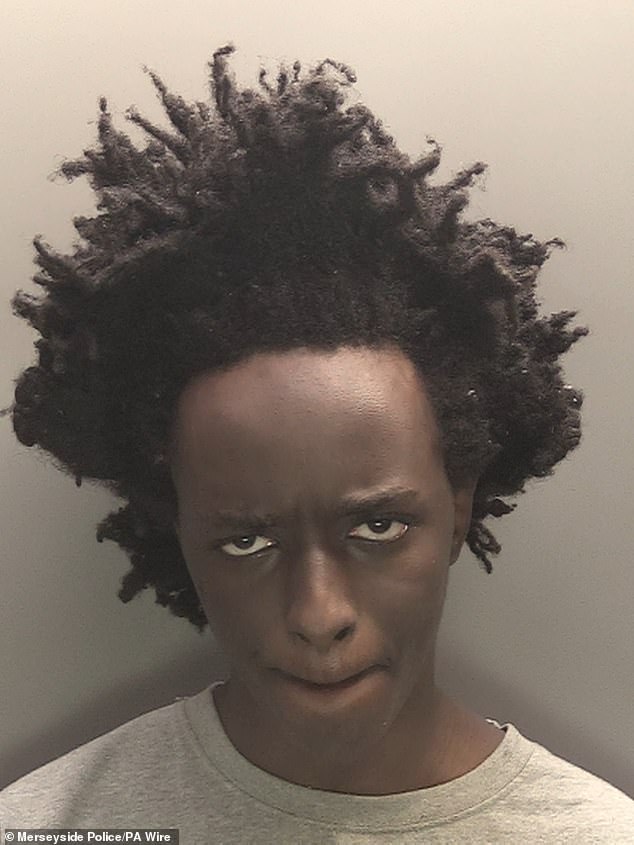
Axel Rudakubana, who at 18 years old, savagely killed three young girls and inflicted life-altering injuries on ten others at a Taylor Swift dance class in Southport last July
People living near the ordinary, polite family who moved to the area in 2017, told the Mail this week that this little street hasn’t been the same since.
One recalls Alphonse, whom some knew as ‘Al’, driving to work in his Ford Fiesta every morning. Another remembers Axel standing outside waiting for a lift to school, kicking stones by the kerb.
Another says Laetitia had a habit of leaving the handbrake off in her car, which would regularly roll a little way down the road. When made aware of the lapse, she would ask her husband to move it back.
Whether they knew the family or not, many people in the area have been heavily affected by what went on here, where the very worst imaginable was being plotted behind closed doors.
‘People are still hurting – they feel it in their hearts,’ says a staff member at the Bargain Express off-licence and convenience store.
Another resident adds: ‘We are getting on – it’s all we can do.’
A few families who lived on this street have left the area because of what happened. ‘They felt they couldn’t stay. [They were] too upset,’ a local explains.
First to go, of course, were Alphonse and Laetitia themselves, who left the area on the day Axel was arrested – never to return.
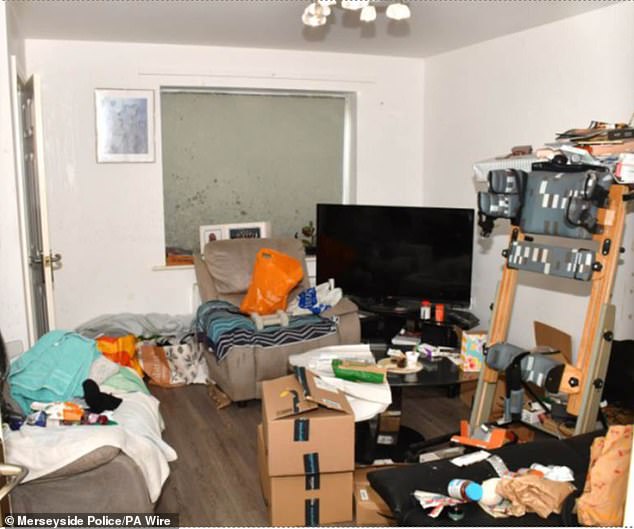
The family living room which, as chilling photographs revealed in court, was being used as a bedroom by the killer
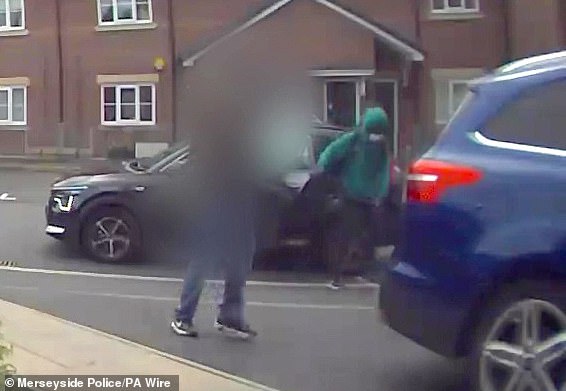
Rudakubana’s father, Alphonse (left), pleaded with a taxi driver not to drive his son (in green hoodie) – who was hellbent on violence – away, thereby stopping his son’s first planned attack
Although they gave witness statements and cooperated with police, neither appeared in court nor have they been seen publicly since that day.
It is impossible to imagine the impact Rudakubana’s actions, and his sickening lack of remorse, have had on his parents, whose younger son is now four months into his 52-year prison sentence.
His face – that chilling, malevolent mugshot – was on the front pages once again this month, after he threw scalding water at a prison guard in HMP Belmarsh.
The incident led to him being relegated to solitary confinement where he is now deemed so dangerous he is being fed through a hatch. Experts have since called for Britain to build US-style ‘super-max’ prisons for inmates who, like him, have no hope of rehabilitation.
Alphonse and Laetitia have faced their share of blame for what happened – in heated debate on online forums and social media, and in the political sphere when then-Reform MP Rupert Lowe asked shortly after the sentencing in January: ‘What did any of the family know?’
There were, of course, the repeated calls they made to local police for help in managing their son’s behaviour, and the apparent aborted attack just a week before the stabbings, when Alphonse pleaded with a taxi driver not to drive his son – who was hellbent on violence – away.
Then there was the family living room which, as chilling photographs revealed in court, was being used as a bedroom by the killer. The floor was strewn with Amazon parcels containing knives while, under the bed, there was a Tupperware box with the deadly poison ricin.
Time and time again, Alphonse and Laetitia must have asked themselves: what could we have done differently? How, they have surely agonised, did our son become such a monster?
It is, without doubt, every parent’s worst nightmare, their every waking moment now plagued by shame and unassuageable grief for the lives he took.
But little has been spoken, in the months since the attack, about the elder Rudakubana brother – whom the Mail has decided not to name – whose young life has been for ever altered by the evil his sibling brought about.
The brothers could scarcely be more different. Even as children there was always something ‘off’ about the younger one, neighbours at the family’s former home in Cardiff recall.
‘He was very quiet, an introvert,’ says one, who used to hear them over the fence in her back garden. ‘The older brother was more boisterous and would stick out his tongue at you.’
As they grew up, and the family moved the coastal village of Banks in 2017, their differences became more pronounced.
The elder brother was a model student with a promising future. Conscientious, hard-working and popular with students and teachers alike, he earned three A*s and two As at A-level and won a place at a top university.
‘There wasn’t one person who didn’t like him,’ a former classmate told the Mail this week. ‘He was thoughtful and funny. He would be interested in other people’s lives and other people’s stories, and ask you questions and look you in the eye.
‘He was very generous, and obviously very intelligent, and a lovely person to be around.’
The same could not be said of his younger sibling. That shy, clingy youngster, a teenage loner whose escalating behavioural problems now seem to be ominous red flags, would go on to become the perpetrator of the worst attack on children in Britain since the Dunblane massacre.
At the time of the rampage, Rudakubana’s elder brother was not living at home. He was away at university, where he had just completed his second year of an undergraduate degree.
The Mail can reveal that he has been unable to return to his studies since the savage attack last July, and is now in police protection with his parents at an undisclosed location.
All are believed to be living under new identities, such is the infamy of the family name.
Geoff Grice, a founder and elder of the Community Church in Southport, an evangelical Christian organisation of which Alphonse Rudakubana was a member, says the entire family are still reeling from the devastating incident.
‘They are good people and the great tragedy for the family, although it’s been appalling for the victims, is it’s shattered their lives.
‘He [the elder brother] is a bright, clever boy who’s with his parents, as far as I’m aware.’
Although they don’t know where the family currently are, church elders have spoken to Alphonse and Laetitia on the phone.
‘We’re not seeing them,’ explains Geoff, 78. ‘They are away under police protection and we do not know where. Our contact with them is extremely limited. There is the occasional telephone call but that is severely monitored in what they can say.
‘They are not able to say an awful lot about where they are or what they are doing.
‘Wherever they go, this will follow them and if they say what their names are people will discover them. All we can say is encouraging words.’
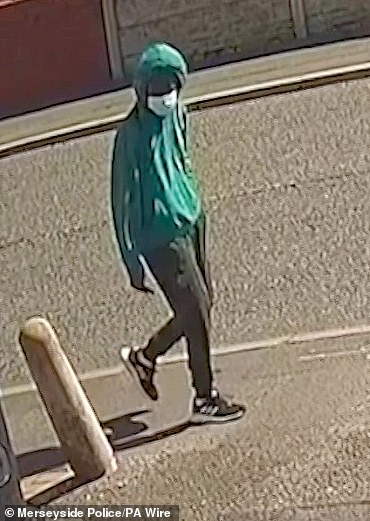
Axel Rudakubana walking to the bus stop on his way to attack young girls at a dance class, leaving his devoutly Christian parents devastated
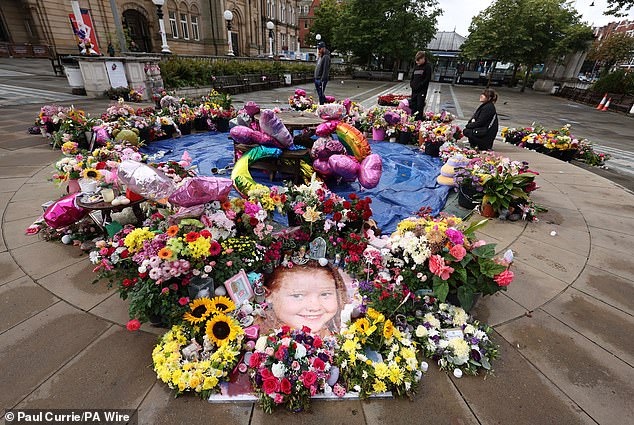
A memorial to the victims: Elsie Dot Stancombe, Alice da Silva Aguiar and Bebe King outside the Atkinson Art Centre
Conversations have been ‘limited to telling them we still care and still pray, and we love them’.
For Rudakubana’s parents, who are devout Christians, such support must be invaluable at a time when kindness and friendship is not easily found.
But for his brother, it can offer only scant comfort, considering what he has lost.
This time last year, he was a thriving, independent young man, living miles from home, excelling in both his studies and extra-curricular activities.
As one former schoolfriend recalls: ‘He was always comfortable to be around.’
A talented musician and singer, he took part in regular student performances, both at the university and in a local arts centre, and clearly relished being on stage.
A video taken last summer shows him smartly dressed in a black shirt and trousers, playing his instrument as part of a tuneful student ensemble.
And then, in an instant, his bright future was torn away, in a maelstrom of hatred – that had nothing to do with him except in name.
Despite growing apart in later years, no longer under the same roof, the anger he must feel towards his younger brother is surely unquantifiable – muddled, no doubt, with disappointment, confusion and fear.
The Rudakubana family had been through hell and back before this – although long before either of their sons were born.
Alphonse and Laetitia fled Rwanda in 2002, as a result of the 1994 genocide, in which their lives – and those of their families, all members of the Tutsi tribe – were thrown into jeopardy.
Laetitia had a prosperous upbringing – her father worked for the ministry of agriculture and her mother was a teacher – but lost more than 200 family members, including an older sister, between April and June 1994, and was forced to flee her home.
Recalling what happened, one of her surviving sisters said in 2020: ‘Kigali [the capital] was filled with dead bodies; it was catastrophic . . . We had to begin again from zero.’
Alphonse, from a less well-off family, is believed to have survived the massacre by hiding in the wilderness, before taking up arms with what became the ruling party, the Rwandan Patriotic Front, and relocating to Uganda.
He and Laetitia met sometime in the 1990s before coming to the UK to find a better life.
Initially they are believed to have sought asylum, but later became British citizens.
Alphonse proudly listed his nationality as ‘British’ when filling in official documents.
In 2004, their first son came along; their second, Axel, was born in 2006. In Cardiff, where they started out, Laetitia had a clerical role at the university’s school of dentistry.
Alphonse later got a job as a minicab driver in Southport, and the whole family relocated in 2013 in search of a bigger house and more stability.
A family friend told the Mail the boys first went to school in the village of Sefton before they bought the house in Banks, on a social housing plot, for just over £41,000. Both boys were later pupils at Range High School in Formby, 14 miles away.
Money was tight, and the following year Alphonse set up an online retail business, Redknapp Ltd – a nod, perhaps, to English football – selling bric-a-brac such as floor mats, laptop stands and jewellery. The enterprise never made more than a few thousand pounds a year – barely enough to tide them over.
Still, Alphonse and Laetitia were determined to give their sons everything they possibly could.
For a time, they accompanied their father, a karate black belt who had spent 20 years learning his craft, to martial arts lessons.
Both boys – not just Axel – were enrolled at the Pauline Quirke Academy, a prestigious drama school in Southport, where pictures show the elder brother smiling enthusiastically at the front of the stage, his sullen sibling always towards the back.
Fees for the Saturday morning sessions the Rudakubana brothers attended would have totalled more than £160 a month – no small sum for a struggling family with only one working parent.
And there were other troubles at home. A family friend, who once offered to bring some African food to the house, recalled being kept at arm’s length by Alphonse, who didn’t seem to want him to visit.
The friend said he mentioned ‘challenges with the kids’ but kept things ‘vague’.
‘He didn’t go into detail but he mentioned his wife and two children who deeply missed their home country,’ he added, about the exchange in 2023.
‘I pressed a little and he replied, “It’s not easy for kids who grew up here to go back there. The culture shock can be overwhelming”.’
Certainly, there is no evidence Alphonse or Laetitia were ever able to return home, nor that their sons ever travelled to Rwanda. They had no family and few friends in the UK – something that is evident on Laetitia’s social media, where she often sent melancholy messages to family members far away.
She sought solace in her faith, turning to the evangelical minister David Turner – who believes in ‘healing’ chronic illnesses and disabilities ‘through the power of Christ’ – to pray for her family.
Indeed, neighbours recall her being prone to Biblical outbursts and proclamations about ‘miracles’ and ‘evil’ in everyday life.
Some report hearing religious music being played loudly inside the family home.
But in Banks this week, the house is eerily silent. One community leader, who asked not to be named, says wounds continue to run deep.
‘It feels like a scar on the village,’ he says. ‘Slowly we are healing, because Banks puts its arms around everybody, and the schools are looking after the children.
‘It’s a village that pulls together and there is a lot of support quietly going on.’
There is also talk of blame, of whether the authorities – on whose radar Axel Rudakubana was for some time before the attack – should have done more, and of how much responsibility Alphonse and Laetitia should bear for what their son did.
One thing is for certain: they won’t be able to come back here.
‘They will never return to Southport,’ says church elder Geoff Grice. ‘That’s it for them, I think. It’s impossible. They will find a new home.’
Wrenched from his friends, his studies and his future, Rudakubana’s brother may never be able to go back to the life he had twelve months ago.
For he, like his parents, is collateral damage in this terrible tale of two brothers. One who went down the path of evil – and one who may have lost everything because of it.
- Additional reporting: JAN DISLEY and STEPHANIE CONDRON












